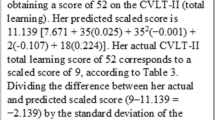Abstract
The neuropsychological assessment is a method of examining the human brain functions by studying its behavioural products. Even though clinical and experimental neuropsychological fields share the same psychometric tools and methods of analysis it is important to keep in mind that in the experimental domain the choice of the assessment methods depends to some extent either on the aim of the study and on the specific sample features. This contribution describes the neuropsychological assessment used in the evaluation of the cognitive functions in subjects affected by multiple sclerosis (MS), considering both its main strengths and weaknesses, with specific attention to the research area of intervention. An important point of discussion will be the relevance of sharing rules and methods of analysis in determining cognitive impairment.
Similar content being viewed by others
References
Amato MP, Zipoli V, Portaccio E (2006) Multiple sclerosis-related cognitive changes: a review of cross-sectional and longitudinal studies. J Neurol Sci 245:41–46
Bolbholz JA, Rao SM (2003) Cognitive dysfunction in multiple sclerosis: a review of recent developments. Curr Opin Neurol 16:283–288
Rogers JM, Panegyres PK (2007) Cognitive impairment in multiple sclerosis: evidence-based analysis and recommendations. J Clin Neurosci 14:919–927
Lezak MD (1995) Neuropsychological assessment, 3rd edn. Oxford University Press, New York
Peyser JM, Rao SM, LaRocca NG, Kaplan E (1990) Guidelines for neuropsychological research in multiple sclerosis. Arch Neurol 47(1):94–97
Sumowski JF, Chiaravalloti N, Wylie G, Deluca J (2009) Cognitive reserve moderates the negative effect of brain atrophy on cognitive efficiency in multiple sclerosis. J Int Neuropsychol Soc 15(4):606–612
Dikmen S, Heaton OK, Grant I, Temkin NR (1999) Test–retest reliability and practice effects of Expanded Halstead–Reitan Neuropsychological Test Battery. J Int Neuropsychol Soc 5:346–356
Johnson BF, Hoch K, Johnson J (1991) Variability in psychometric test scores: the importance of the practice effect in patient study design. Prog Neuropsychopharmacol Biol Psychiatry 15:625–635
Temkin NR, Heaton RK, Grant I, Dikmen SS (1999) Detecting significant change in neuropsychological test performance: a comparison of four models. J Int Neuropsychol Soc 5:357–369
Lewis RF, Rennick PM (1979) Manual for the repeatable cognitive–perceptual motor battery. Axon Publishing Company, Grosse Pointe Park, MI
McCaffrey RJ, Westervelt HJ (1995) Issues associated with repeated neuropsychological assessments. Neuropsychol Rev 5:203–221
Rao SM, the Cognitive Function Study Group of the National Multiple Sclerosis Society (1990) A manual for the Brief Repeatable Battery of Neuropsychological Tests in multiple sclerosis. Medical College of Wisconsin, Milwaukee, WI
Benedict RHB, Fischer JS, Archibald CJ, Arnett PA, Beatty WW, Bobholz J, Chelune GJ, Fisk JD, Langdon DA, Caruso L, Foley F, LaRocca NG, Vowels L, Weinstein A, DeLuca J, Rao SM, Munschauer F (2002) Minimal neuropsychological assessment of MS patients: a consensus approach. Clin Neuropsychol 16:381–397
Benedict RHB, Cookfair D, Gavett R, Gunther M, Munschauer F, Garg N, Weinstock-Guttman B (2006) Validity of the minimal assessment of cognitive function in multiple sclerosis (MACFIMS). J Int Neuropsychol Soc 12(4):549–558
Barker-Collo SL (2005) Within session practice effects on the PASAT in clients with multiple sclerosis. Arch Clin Neuropsychol 20:145–152
Benedict RHB, Duquin JA, Jurgensen S, Rudick RA, Feitcher J, Munschauer FE, Panzara MA, Weinstock-Guttman B (2008) Repeated assessment of neuropsychological deficits in multiple sclerosis using the Symbol Digit Modalities Test and the MS Neuropsychological Screening Questionnaire. Mult Scler 14:940–946
Boll TJ, Heaton R, Reitan RM (1974) Neuropsychological and emotional correlates of Huntington’s chorea. J Nerv Ment Dis 158(1):61–69
Camp SJ, Stevenson VL, Thompson AJ, Miller DH, Borras C, Auriacombe S, Brochet B, Falautano M, Filippi M, Hérissé-Dulo L, Montalban X, Parrcira E, Polman CH, De Sa J, Langdon DW (1999) Cognitive function in primary progressive and transitional progressive multiple sclerosis. Brain 122(7):1341–1348
Kujala P, Portin P, Ruutiainen J (1997) The progress of cognitive decline in multiple sclerosis. A controlled 3-year follow-up. Brain 120:289–297
Stanczak EM, Stanczak DE, Templer DI (2000) Subject-selection procedures in neuropsychological research: a meta-analysis and prospective study. Arch Clin Neuropsychol 15(7):587–601
Conflict of interest statement
The author declares that she has no conflict of interest related to the publication of this article.
Author information
Authors and Affiliations
Corresponding author
Rights and permissions
About this article
Cite this article
Falautano, M. Neuropsychological assessment: experimental and clinical research. Neurol Sci 31 (Suppl 2), 223–226 (2010). https://doi.org/10.1007/s10072-010-0371-9
Published:
Issue Date:
DOI: https://doi.org/10.1007/s10072-010-0371-9




